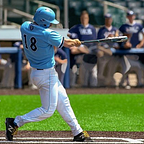Justin Verlander is Living in 1987
In 1986, Bert Blyleven had a season that most pitchers would try to forget. His 4.01 ERA was the second highest of his 17-year career, and his 4.33 FIP was 1.42 higher than his lifetime mark of 2.91. For a starting pitcher who had been extremely effective throughout his big league tenure, Blyleven was very… average. But there’s one big, fat, ugly stain on his stat sheet from that year: 50 home runs allowed, the most ever in a single season.
His season-long performance, though poor by Blyleven’s Hall of Fame standards, wasn’t terrible. Aside from giving up a record number of long-balls, Bert was still reliable. He threw 16 complete games, led the American League in K/BB, and had one of his better seasons in terms of WHIP (1.178). There was no glaring statistical source of the anomalous home run total, and ultimately no cause for concern.
But then Bert Blyleven allowed 46 home runs in 1987, and it was clear that something was wrong. The Hall of Fame righty, who had never given up more than 24 home runs in a season, had just posted back-to-back seasons allowing 30 home runs before the All Star break. Yes, something was wrong, but not just with our friend Bert.
Home runs increased by nearly 17% in 1987, and players who were not notorious for their power began parking balls on a regular basis. Take Wade Boggs, for example, whose career high for home runs at the time was eight, a number so small I spelled it out for you. In 1987, Boggs tripled his previous benchmark and hit 24 home runs. That one, single season would account for over 20% of the home runs he hit during his entire 18-year career.
Something was wrong with baseball, or rather, the baseball.
The effect of the genetically mutated ball, affectionately known as the “Rabbit Ball”, was profound. However, despite the universal theory that the baseball was juiced, MLB officials vehemently denied any accusations of alteration.
*******************************************************************
The 2019 MLB season has been characterized by players making off-barrel contact, flinging their bats in frustration, and looking up to see the ball sail over the fence. Home runs are being hit at a historic rate despite fewer balls being put into play. Part of this phenomenon has to do with hitters adopting new-school launch angle approaches, but it would be foolish to ignore the most logical explanation for the spike in homers: the return of the Rabbit Ball.
Perhaps no pitcher has been affected by the mass exodus of baseballs more than Justin Verlander, who gave up a Blyleven-esque 26 home runs before the All Star break. This is extremely uncharacteristic of Verlander, whose career high for home runs allowed is 30 (2016). However, unlike Blyleven in 1986 and 1987, Justin Verlander is having a dominant season.
In 20 starts, Verlander has posted an astonishing 0.814 WHIP, the best in the major leagues and the best of his 15 year career. He’s also giving up a league-lowest 5.4 hits per 9 innings, which is also a career mark. Unfortunately, 32.5% of those hits have been home runs. It just doesn’t make sense.
Verlander is fully aware of the Rabbit Ball’s triumphant return, and he hasn’t been quiet about it.
In an interview with ESPN during the All Star break, Verlander called the phenomenon “a fucking joke”. He continued on to say “Major League Baseball’s turning this game into a joke. They own Rawlings, and you’ve got Manfred up here saying it might be the way they center the pill. They own the fucking company. If any other $40 billion company bought out a $400 million company and the product changed dramatically, it’s not a guess as to what happened. We all know what happened. Manfred the first time he came in, what’d he say? He said we want more offense. All of a sudden he comes in, the balls are juiced? It’s not coincidence. We’re not idiots.”
The parallels to the 1987 Rabbit Ball season are undeniable. The baseball is leaving the yard more than ever before, and Major League Baseball is acting like they didn’t just eat the last cookie in the jar. They don’t know anything about it.
*******************************************************************
The dance of accusation and denial can go on forever, but the truth always rises to the surface. Following the explosive 1987 season, the rabbit gathered as much food as he could, hopped back into his hole, and hibernated. Home run totals decreased by over 28% in 1988, and would not return to 1987 levels until 1996 (an era also characterized by juice). Bert Blyleven returned to form, and gave up a measly 21 long balls. The cosmos had realigned, and baseball was back to normal.
Now, Major League Baseball finds itself at an interesting crossroads. If Rob Manfred opts to remove the proverbial rabbits from the baseball, everyone will be aware of his dishonesty. If he leaves things as is, the sport will move even closer to a game of three true outcomes and suffer from a lack of action.
This is a very important time for baseball, and the league must be careful not to change too much in a desperate effort to make the game “more exciting”. A short term change like juicing the baseball could have a profound effect on the future of the sport. Manfred has to tread lightly.
Oh, and if you’re wondering who the 2019 version of Wade Boggs is, look no further than Christian Vazquez, who has hit 15 home runs in 290 plate appearances this season. In his previous 999 plate appearances, he only hit 10. The damn Rabbit Ball, man.
Follow me on Twitter @Ben13Porter
